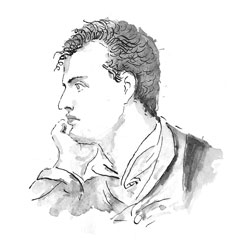Lord Byron
George Gordon Byron, 6th Baron Byron, was born in 1788 to an impoverished and somewhat chaotic noble family. Harrow was the last of several schools he attended, before he attended Trinity College, Cambridge, from 1805-1807. During his student years he overspent enormously, wrote his first poems, and developed his skills in scandalous behaviour. These three things were key facets of the rest of his life. Notoriously, according to one contemporary, he may have kept a tame bear in the College, because he was not allowed to keep a dog. (The Oxford Dictionary of National Biography, the source for the facts in this short biography, seems tellingly non-committal on whether this actually happened.) Dogged by debt and scandal, but remarkably prolific in his writings, Byron became a celebrity in Britain and further afield. In 1816, when his marriage broke down, rumours and disapproval caused him to leave the country, and he spent his remaining years in Italy and Greece. He joined the fight for Greek independence from the Ottoman empire, and it was during these escapades that he fell ill and died in 1824. Again and again he demonstrated remarkable magnetism, whether physical, emotional, literary, or military. As a personality, as the inventor of a literary type overlapping with that personality (the brooding Byronic Hero), and as the writer of dazzling works, he exerted and still exerts remarkable influence.
He is most famous as a poet, and among his many works two stand out: Don Juan is his masterpiece, a story of love and travel on an epic scale, both magnificent and witty; Childe Harolds Pilgrimage also centres on quest-like journey. He also wrote plays, where his ideas of heroism found dramatic expression, and was a great writer of letters, brilliantly catching the passion and drama of his life. As with the other earlier writers on this site, you can find Byron's work in many different books and on various websites. He is always worth reading! If you want to pursue a good edition, however, Jerome McGann's Oxford Authors selected edition Byron (Oxford, 1986), which is a shorter version of McGann's Complete Poetical Works, 7 vols (Oxford, 1980-1993), is a good place to start.
Most of the resources on Cambridge Authors focus on the links between Byron's life and work. Here you'll get an idea of how he worked, how he presents himself, and most of all how we should think about the poems in relation to the man who wrote them. Using the menu on the left, you will also find some materials relating to Don Juan and its special stanza form.
